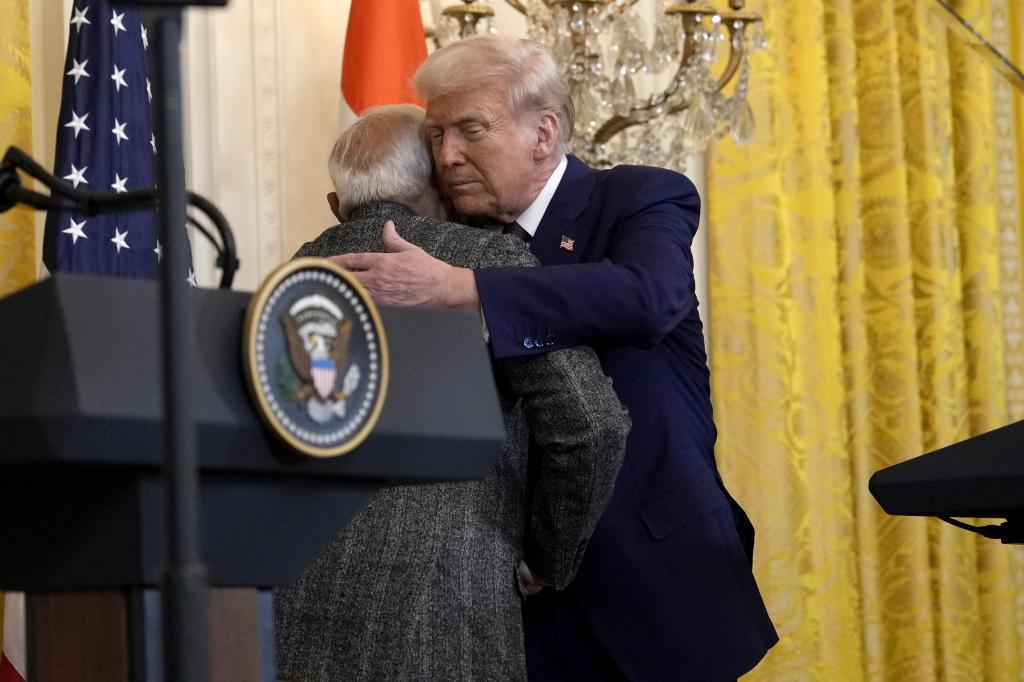After six months of appeasing Moscow without success, the President of the United States, Donald Trump, seems to have decided to use sanctions on Russian oil sales to force Moscow to agree to a ceasefire in Ukraine. However, he has done so by attacking one of the United States' biggest allies in the world, India, which is also a strategic rival of China, the country that poses the greatest threat to U.S. global supremacy.
Trump stated yesterday that India has "24 hours" (approximately until early afternoon in Spain) to do something, which not only includes buying less oil from Russia but also fewer weapons from that country (presumably implying more from the U.S.). The issue is that he has not specified what he wants Delhi to do. The U.S. President has threatened to substantially raise the tariffs that American importers must pay when buying Indian goods, but has not provided further instructions on what he expects from the government of his ally, Narendra Modi.
Tomorrow, Thursday, the new 25% tariffs unilaterally set by the U.S. President on Indian imports will come into effect, in addition to the potential tariffs on Russian oil if they materialize. And on Friday, the ultimatum given by Trump to Vladimir Putin to agree to a ceasefire in Ukraine expires. Otherwise, he has stated, there will be a wave of sanctions. Given that the U.S. has very limited trade with Russia - which it is reluctant to give up, as it involves strategic minerals - and imports almost nothing from Russia, it is assumed that the sanctions would be "secondary," affecting countries that do trade with Russia.
Externally, India remains firm and refuses to reduce its purchases of Russian hydrocarbons. Delhi issued a statement yesterday reminding that the EU maintains active trade in raw materials - including oil and gas - with Russia, despite a reduction after the invasion of Ukraine. It also explained that the U.S. continues to buy "uranium hexafluoride for its nuclear industry and palladium for its electric vehicle industry, as well as fertilizers and chemicals" from Vladimir Putin's regime.
However, actions seem to point in another direction. According to the news agency Reuters, India's largest refinery company, India Oil Corporation, has drastically increased its purchases of American, Canadian, and Middle Eastern crude oil to be delivered in September, anticipating the suspension of Russian oil arrivals. The company has acquired 7 million barrels, with 73% being American. Other major Indian refineries have also suspended the purchase of Russian oil, and even shipments that have already left Russia may never unload their hydrocarbons. According to ship tracking by the financial information company Bloomberg, last Friday there were at least four Russian tankers detained on the edge of Indian territorial waters, awaiting a decision by Indian authorities.
Indian companies have asked the Modi government for guidance, and it has only advised them to prepare contingency plans to ensure alternative supplies from Middle East, the United States, and West Africa. This change would not only pose a significant logistical challenge but could also have repercussions on global oil markets. If India drastically reduces its purchases from Russia, it would have to compete more aggressively in other regions, potentially driving up prices and destabilizing procurement strategies of other major importers.
India buys around 38% of Russian oil exports leaving that country by sea, supplying about a third of its demand. Moscow sells the oil to India at $55, with a discount of about five dollars per barrel, allowing the Asian country to save around ¤10 billion annually. China is the largest importer of Russian oil, accounting for 48% of that country's foreign sales. However, Trump has not threatened Beijing. In fact, the U.S. President has lifted most restrictions on exporting microprocessors and high technology to China and even prohibited the President of Taiwan - a country whose independence Beijing does not recognize - from making a technical stop in New York.
Trump's sudden sensitivity towards China seems to stem from his desperation for China to accept a trade deal and lift the covert embargo it has imposed on essential raw materials for Western, particularly U.S., weapons. At the moment, Beijing does not seem interested in any agreement with Washington.
All these economic considerations raise questions in India about whether Trump really wants Putin to order his cannons to stop firing at Ukrainians or simply wants India, the third-largest consumer and importer of oil in the world, to stop buying that energy source from Russia and switch to the U.S.
Trump also faces a major economic and political problem with the oil industry in his own country, the world's largest producer of that hydrocarbon. Tariffs on steel and aluminum have significantly increased the cost of extracting U.S. oil, which is largely obtained through fracking, a controversial technique that makes it about ten times more expensive than oil from, for example, Saudi Arabia.
At the same time, the uncertainty created by the White House with its tariffs is slowing down the U.S. and global economy, with little growth in demand for gasoline and other oil derivatives (except in India). U.S. oil companies were among the biggest financiers of Trump's campaign, but now find that 'their' candidate's policies indirectly do not favor them, to the extent that U.S. oil production is set to decline this year for the first time in a decade, as it is not profitable to open new wells.
